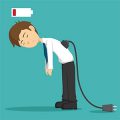
By treating depression psychologically, we can help redefine clients' perspectives and provide hope
“I never treat depression! It’s just too complicated!”
I’ve heard many versions of these gloomy statements from practitioners over the years.
From hypnotherapists with lingering ideas of hypnosis as taboo in treating depression, to counsellors who feel ill-equipped to be strategic when treating depressed clients – often underlying their reticence, I suspect, lurks fear.
Fear that we might be ineffective or actually make things worse.
Many just don’t feel confident to treat this most common but harrowing of conditions. And that is a problem.
Prefer to watch instead?
Many talk therapists still defer to the medical model of what depression is and how best to treat it. We bow down before the almighty psychiatric experts, the chemical wizards twitching behind the curtain, while a tidal wave of depression threatens to sweep away the wellbeing of the Western world.
Even among those of us who do choose to treat depression psychotherapeutically there persists a fear of the condition, a superstition even.
But depression thrives on fear and hopelessness, and we practitioners should never fall into its trap. Feeling hopeless – depressed, even – about the treatment possibilities for the depressed helps nobody.
We, you and I, unequipped with drug products to offer our clients, can feel really optimistic when treating depression. We don’t have to rely on drugs because we have something potentially so much better. We can make all the difference in the world. And here’s why.
Depressing but hopeful facts about depression treatment
More people than ever before are consuming antidepressant drug products.1 Yet rates of depression continue to soar, especially in young people.2
Medicating what may be more of an existential disease than a biological one may be backfiring; making people feel more hopeless. This is especially true given that long-term consumption of these products can cause weight gain, type 2 diabetes,3 anxiety, sexual dysfunction and sleep disorders, along with a host of other side effects, some of them akin to depression itself.
In short, current research suggests that:
- Antidepressants do not significantly outperform placebos.4
- Depression is not ‘genetic’. People are not biologically predestined for depression. There is little evidence that depression is caused by neurobiology (although it has neurobiological effects).5 Our lives can sometimes lack meaning, but it is not because we inherit Prozac deficiencies.
- Depressive attitudes (such as pessimism, perfectionism, black-and-white thinking, learned helplessness) are so often, indeed, learned rather than ‘passed on through genes’.6
None of this is to say that no depression has biological roots – simply that the idea that most depression is the fault of biology gone haywire isn’t a credible one. Some antidepressants do seem to help people, and who can blame harried doctors, overwhelmed by a caseload of human misery, for prescribing them?
But depression is rising in the young and 1000% more prevalent than fifty years ago, and if this is biological, then what is causing our collective biology to shift so quickly and dramatically? Social factors, living conditions and depressive attitudes should never be ignored in favour of the bad-brain-chemical idea.
But here’s the thing.
If the chemical imbalance idea has been oversold, we have reason for hope.
Most depression can be treated psychologically, incorporating a detailed look at someone’s diet and exercise styles. People don’t have to feel they are destined to carry a lifelong medical label for what is, essentially, an emotional condition.
We and our clients need never be fatalistic about what depression is or dismiss the idea that it can lift – and stay lifted – without our resorting to drugs. So, broadly speaking, what do we need to do when helping someone out of depression?
Seeing clearly
To treat depression effectively we need to understand that:
- Depression is a state of physical and mental exhaustion. It comes about when too much negative, non-solution-focused rumination leads to an excess of REM sleep, which exhausts the person and leads to further rumination, continuing the spiral.7
- The depressed person has become stuck and needs help to think, feel and act differently. They need to get out of that rut and get the rest they need so as to be able to meet their fundamental needs.
- Rumination is a huge risk factor for depression and also happens to maintain it. Hope, on the other hand, is vital for depression recovery because depression is all about negative expectations.8 This explains why expecting an antidepressant drug to work seems to be the main factor that determines whether it will work.9
Once we grasp these points about how depression works, we can take three essential steps towards treating it.
Step 1. Describe what is happening to them
As early as possible, we want the depressed person to begin to see their depression ‘from the outside’ as a pattern of experience rather than part and parcel of who they fundamentally are. We need to begin to remove it from their core identity so it becomes easier to detach from. Of course, we need to do this in the context of listening to the client to build a sense of mutual understanding and rapport.
By gently describing the cycle of depression and relating it to their experience, we help our clients understand how depressions are formed and maintained in the brain and body.
A depressing cycle
A build-up of unresolved emotional worry overburdens the brain’s REM response, causing excessive dreaming at night, leading in turn to physical and mental exhaustion during the day. The more exhausted the client, the more likely they are to ruminate further. And so the vicious cycle continues – until you come along.
A depressed client feels that you really understand where they are coming from when they hear questions like:
- Do you always feel exhausted when you wake in the morning – and the more you sleep, the more tired you get?
- Does everything tend to seem very black and white, all or nothing, to you, with no shades of grey in between?
- Do you tend to dwell on the past or current or future events, spending a lot of time ‘in your head?’
- Do you feel physically exhausted one minute and agitated the next?
Such questions highlight how depression is an easily understood pattern of experience.
You can reassure your client that one of the first signals of recovery they’ll experience as they start to come out of depression will be an increase in energy and a feeling of clarity and perspective. Remember that rumination drives exhaustion and depression. But it’s been found that once the sunny glint of hope enters the mind, rumination becomes much less of a depressive force.10
Be the hope for your client until they can generate their own. But before this can work you may have to do something even more fundamental.
Step 2. Help your depressed client to relax
This is essential. A depressed brain is a stressed brain.11 Master as many relaxation techniques as you can in order to be able to help clients relax effectively. Be relaxing by way of your reassuring demeanour.
The most wonderful ‘cognitive reframing’ techniques in the world will have little effect on a brain worn out by stress, anxiety, and exhaustion. In such a state, flooded with stress hormones, the brain struggles to take on new perspectives. It’s like trying to see your reflection in a lake when a storm is raging. For clarity and perspective you need calm, but all you have is distortion.
When clients begin to leave depression behind they will not just feel better and think more flexibly, they will also behave differently. It’s a two-way street: while depressive rumination leaves a sense of the ‘unfinished business’ of unsolved problems, getting stuck into actions that do have resolutions is a powerful antidepressant. So, if possible…
Step 3. Set ‘tasks’ that are intrinsically satisfying
Satisfying therapeutic tasks have a beginning, middle, and end. Even just writing a letter, putting it in an envelope, putting a stamp on it and posting it can remobilize the dopamine reward pathways in the brain and reactivate the left prefrontal lobe, the part that becomes much less active during depression.
Okay, the example of posting a letter was very last century. An email, then. Or anything that requires a few steps and a resolution, however modest in the grand scheme of things.
Your client may be thinking in all-or-nothing terms. Depression relies upon simplistic generalizations and extremist thinking. They may object to carrying out the task, feeling that it won’t lift the depression. Of course, they’ll be right – but it can begin to work the muscles of the mind that resist depression. And talking of muscles…
Exercise has been shown to be as effective at lifting depression as antidepressants and also better at preventing relapse – and with only good side effects.12 Results are especially good if the movement happens outside and forest environments seem to have a particularly strong antidepressant effect.13
Of course, depressed clients may need help to get to the point where they can accept intrinsically satisfying tasks, and it may take a while for these activities to become intrinsically satisfying. But ultimately we want our clients, one way or another, engaging in activities that help them meet their primal human needs.
Your depressed client needs to get back into the habit of actually taking steps to change unwanted situations rather than passively worrying about their problems without resolving them. Tasks can significantly help to get your client used to acting positively again.
In cases where practical changes are not feasible, you can still help your client to feel differently about what cannot be changed. Clinical hypnosis can be used both to rehearse tasks and to make it more likely that they will actually be carried out. Research shows that you’re more likely to actually do something when you have imagined yourself doing it from the point of view of an observer.14
Of course, effective psychotherapeutic depression treatment may need to include many more interventions, but these three actions, reassuring by normalizing, relaxing, and setting rewarding tasks, are essential steps to get your clients well on the road to recovery.
It’s no small thing to help someone escape and stay free of depression. All of a sudden, I’m reminded of the ancient Talmudic saying:
“Whoever saves a life saves an entire world.”
Our How to Lift Depression Fast home study course provides a structured, tried-and-tested approach to rapid, solution-focused depression treatment. Read more here and sign up to be notified when the course is open for booking.
Notes:
- http://www.oecd-ilibrary.org/sites/health_glance-2013-en/04/10/index.html?itemId=/content/chapter/health_glance-2013-41-en
- https://www.ncbi.nlm.nih.gov/pmc/articles/PMC3330161/
- http://ajp.psychiatryonline.org/doi/abs/10.1176/appi.ajp.2008.08071065
- See The Emperor’s New Drugs: Exploding the Antidepressant Myth (2009) by Irving Kirsh
- See https://link.springer.com/chapter/10.1007/978-0-585-37970-8_2 and https://www.researchgate.net/profile/Juergen_Barth/publication/8163697_Depression_as_a_Risk_Factor_for_Mortality_in_Patients_With_Coronary_Heart_Disease_A_Meta-analysis/links/0912f4fbcecee0c33c000000.pdf
- See Hand-Me-Down Blues: How To Stop Depression From Spreading In Families (2000) by Dr Michael Yapko
- http://www.clinical-depression.co.uk/dlp/understanding-depression/using-the-cycle-of-depression/
- http://www.apa.org/monitor/nov05/cycle.aspx
- https://www.ncbi.nlm.nih.gov/pmc/articles/PMC4172306/
- https://ijmhs.biomedcentral.com/articles/10.1186/1752-4458-8-53
- http://go.galegroup.com/ps/anonymous?p=AONE&sw=w&issn=00368075&v=2.1&it=r&id=GALE%7CA3560576&sid=googleScholar&linkaccess=fulltext&authCount=1&isAnonymousEntry=true
- James A. Blumenthal, Ph.D. and his colleagues surprised many people in 1999 when they demonstrated that regular exercise is as effective as antidepressant medications for patients with major depression. The researchers studied 156 older adults diagnosed with major depression, assigning them to receive the antidepressant Zoloft (sertraline), 30 minutes of exercise three times a week, or both. According to Blumenthal, “Our findings suggest that a modest exercise program is an effective, robust treatment for patients with major depression who are positively inclined to participate in it. The benefits of exercise are likely to endure, particularly among those who adopt it as a regular, ongoing life activity.”
- https://www.ncbi.nlm.nih.gov/pubmed/17055544
- Seeing future success: Does imagery perspective influence achievement motivation? Vasquez N.A. and Buehler, R. Personality and Social Psychology Bulletin, October 2007 vol. 33 no. 10 1392-1405










